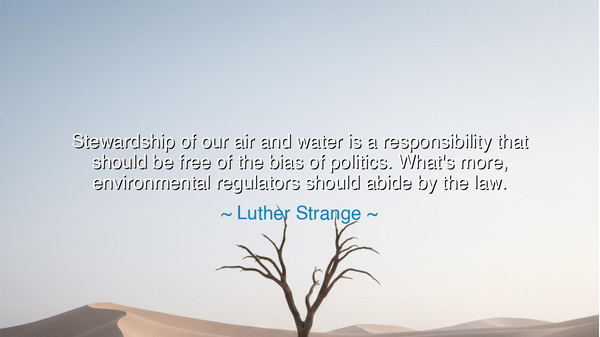
Stewardship of our air and water is a responsibility that should
Stewardship of our air and water is a responsibility that should be free of the bias of politics. What's more, environmental regulators should abide by the law.






In the calm yet commanding tone of ancient wisdom, Luther Strange spoke words that reach beyond the chambers of politics and into the heart of moral duty: “Stewardship of our air and water is a responsibility that should be free of the bias of politics. What’s more, environmental regulators should abide by the law.” These words are not mere policy—they are a covenant between man and the earth that sustains him. They remind us that stewardship is not an act of convenience or a tool of ideology, but a sacred trust. For air and water are not possessions to be owned, but blessings to be protected. To neglect them for gain, or to twist their guardianship for political favor, is to betray the generations yet unborn.
In the ancient world, the wise viewed nature as both mother and teacher. The Greeks spoke of Gaia, the living earth, whose bounty was to be honored, not exploited. The prophets of old warned that when man polluted the rivers and stripped the forests, he not only wounded the land but also his own soul. Luther Strange echoes that timeless truth: that responsibility for the earth transcends party and creed. It belongs to the conscience of humanity itself. The air we breathe does not bear the color of any flag, and the waters that sustain us do not vote. Thus, to bind their care to politics is to make folly of the sacred.
When Strange declared that environmental regulators should abide by the law, he invoked an even deeper principle—the harmony between justice and nature. For law, when rooted in truth, is not a cage but a compass. It ensures that the guardians of the environment do not become tyrants in its name, nor puppets of ambition. The rule of law, like the flow of a river, must remain clear, impartial, and constant, guiding stewardship away from corruption and into clarity. A regulator without obedience to law is like a captain who ignores the stars; both may command power, but neither will reach the right shore.
History, ever the stern teacher, offers us a warning. In the industrial age of the 19th century, cities like London and Pittsburgh choked under black skies and poisoned rivers. Factories roared, wealth surged, and yet children coughed in the streets while fish floated lifeless in the Thames. It was only when citizens rose above politics—when lawmakers, scientists, and ordinary people united in conscience—that reform took root. In America, The Clean Air Act and Clean Water Act were born not from party loyalty but from collective awakening. These acts were imperfect yet noble attempts to heed the call of stewardship, proving that when humanity obeys both law and conscience, the earth begins to heal.
But the lesson of Strange’s words goes beyond governments—it reaches into the soul of each individual. For every man and woman is a steward in their own realm. Each time we waste less, plant more, or speak for the voiceless rivers and forests, we participate in the sacred duty of care. When we choose integrity over convenience, we honor that same law he spoke of—the unwritten law of creation, older than nations, purer than politics. To live as a steward is to recognize that we are not owners of the earth, but caretakers for those who will follow.
Let the young and the wise alike understand this truth: to protect the earth is not to oppose progress, but to perfect it. A civilization that consumes without conscience builds its own ruin; but a civilization that preserves while it prospers earns eternity. Strange’s call is both practical and poetic—to remove the pollution of politics from the purity of nature, and to replace ambition with accountability. The law must protect what greed would devour, and the conscience must guide what power would forget.
Therefore, remember this, children of the coming dawn: the air you breathe today was once the breath of your ancestors, and the water that flows through your hands will one day nourish your descendants. Treat them with reverence. Defend them without bias. Let your leaders be bound by law and your actions guided by care. For when the stewardship of earth becomes a shared devotion rather than a divided debate, humanity will once again walk in harmony with creation.
And so the teaching stands: true stewardship is both moral and lawful, humble and eternal. It is not for the gain of the few but for the survival of the many. Uphold it with courage, and you will find not only cleaner skies and purer waters—but a clearer soul and a nobler world.






AAdministratorAdministrator
Welcome, honored guests. Please leave a comment, we will respond soon